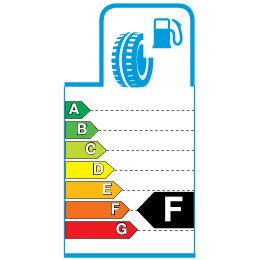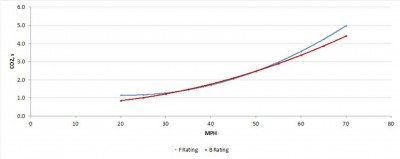Eco tyre fuel savings minimal during urban driving, opines specialist
 An 'F' for the fuel economy rating at urban speeds?
An 'F' for the fuel economy rating at urban speeds?
According to Emissions Analytics, ratings printed on the European tyre label do not tell the “full story”. The Winchester-based company, which specialises in supplying real-world fuel consumption and emissions data based on tailpipe measurements, states that tyres with an F-rating for fuel economy perform as well as B-rated tyres at mid-range speeds.
This claim is based upon on-road tests Emissions Analytics carried out using two sets of 175/70 R14 tyres. One set had a B label rating for fuel economy and the other an F rating. The test route incorporated a range of steady-state speeds from 40mph to 70mph on tarmac in consistent ambient temperatures. What Emissions Analytics found was that on average the B rated tyre only managed a 3.8 per cent improvement in mpg in the 40-70 mph range and emitted 3.4 per cent less CO2; the company notes that “there isn’t much in it at the mid-range speed” although a “performance gap” opens up at 55mpg. By the time speeds reached the UK motorway speed limit of 70 mph, the difference in fuel economy between the B and F tyres reached 12.9 per cent
“Thus a consumer buying B rated tyres is unlikely to notice a fuel economy benefit if the journeys they customarily make are mainly urban. Whereas a consumer heading up and down the motorway each day should enjoy an improvement,” writes Emissions Analytics.
“Now this was an unashamedly quick and dirty investigation but it does demonstrate that the relationship between rolling resistance and fuel economy is not linear and that to bring real improvements to the way tyres are bought and sold manufacturers need to adopt more sophisticated models,” the company continues.
Emissions Analytics says the current tyre labelling system, made mandatory by the EU in November 2012, is not working. A strong opinion, and one it supports by citing research compiled by the National Tyre Distributors Association and Lanxess, which found that after a year of labelling 93 per cent of tyre retailers said customers never or only occasionally requested information on the label, and that only 30 per cent knew that tyres affect fuel consumption.
“We think manufacturers need better models to translate rolling resistance calculations into fuel economy effects. Improved, independently verified testing and labelling, perhaps with a monetary quantification of the typical benefit would provide a tangible benefit that the consumer would welcome,” concludes Emissions Analytics.




Comments